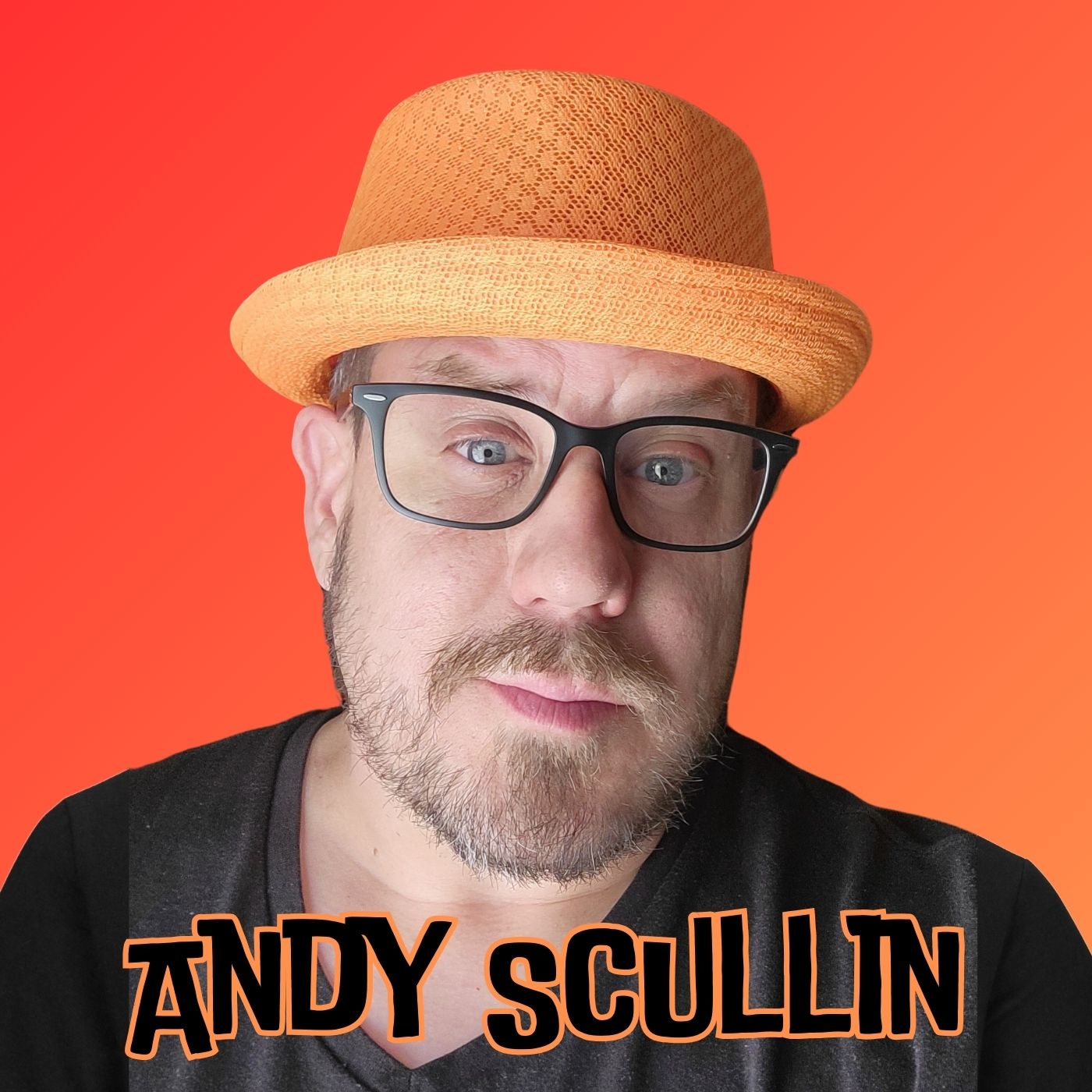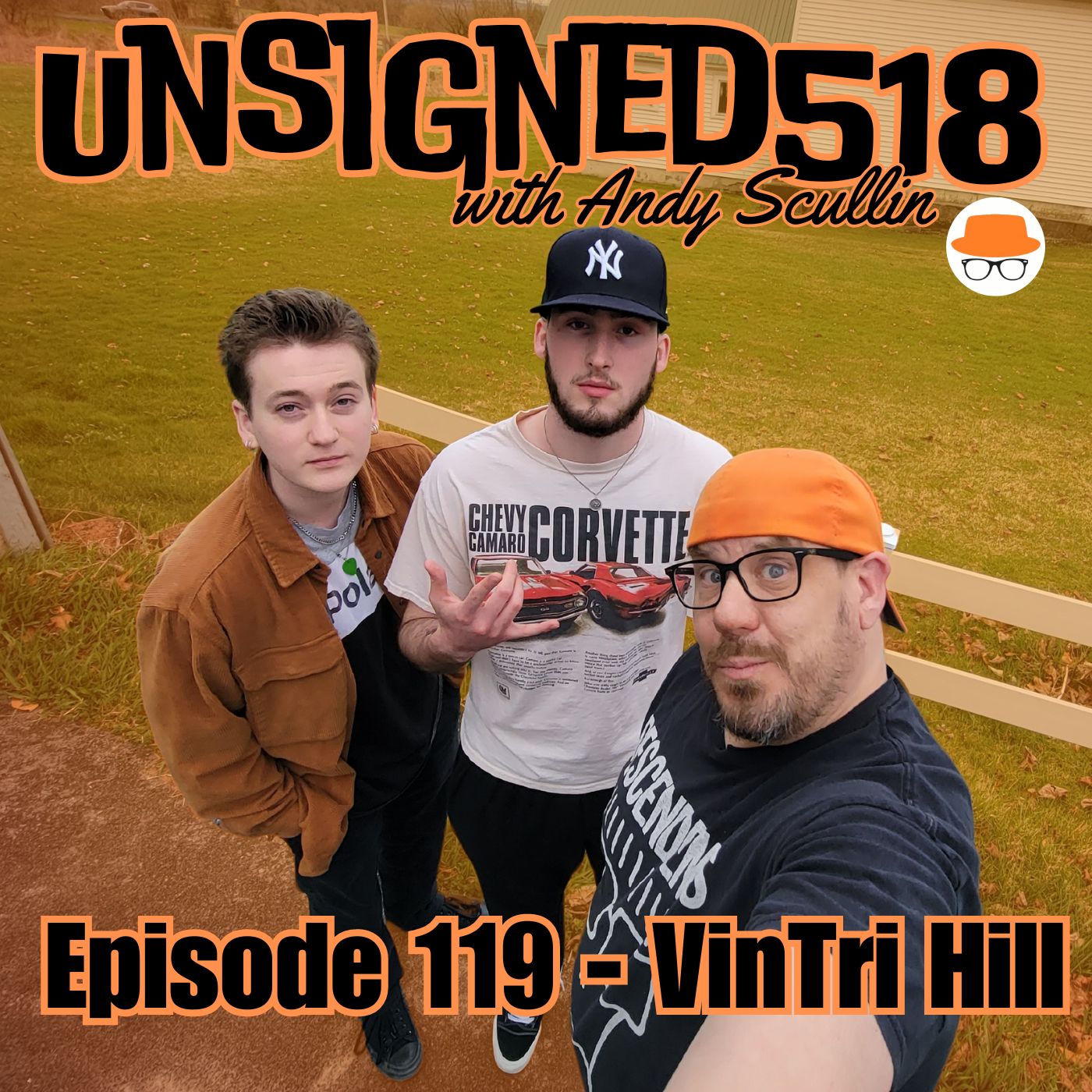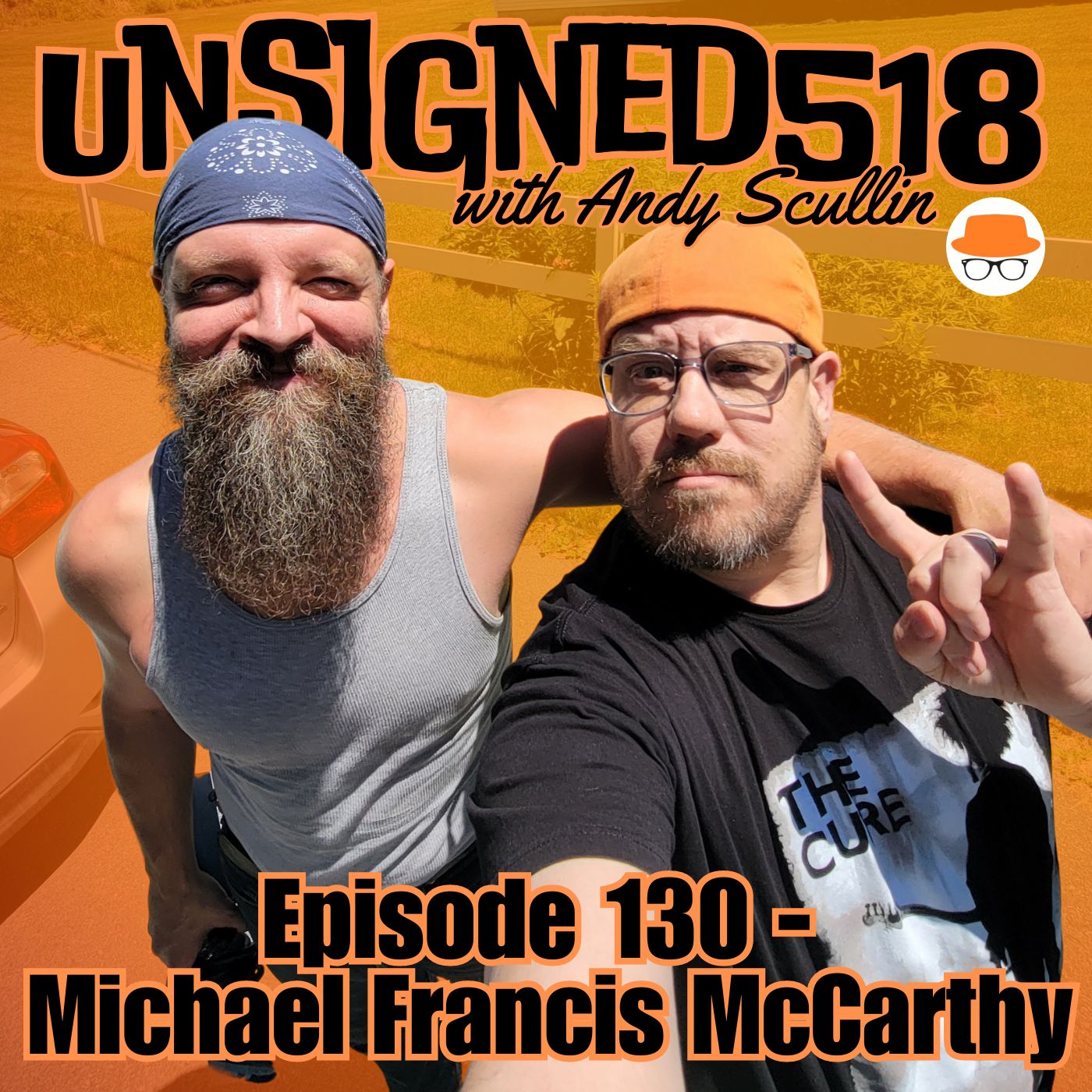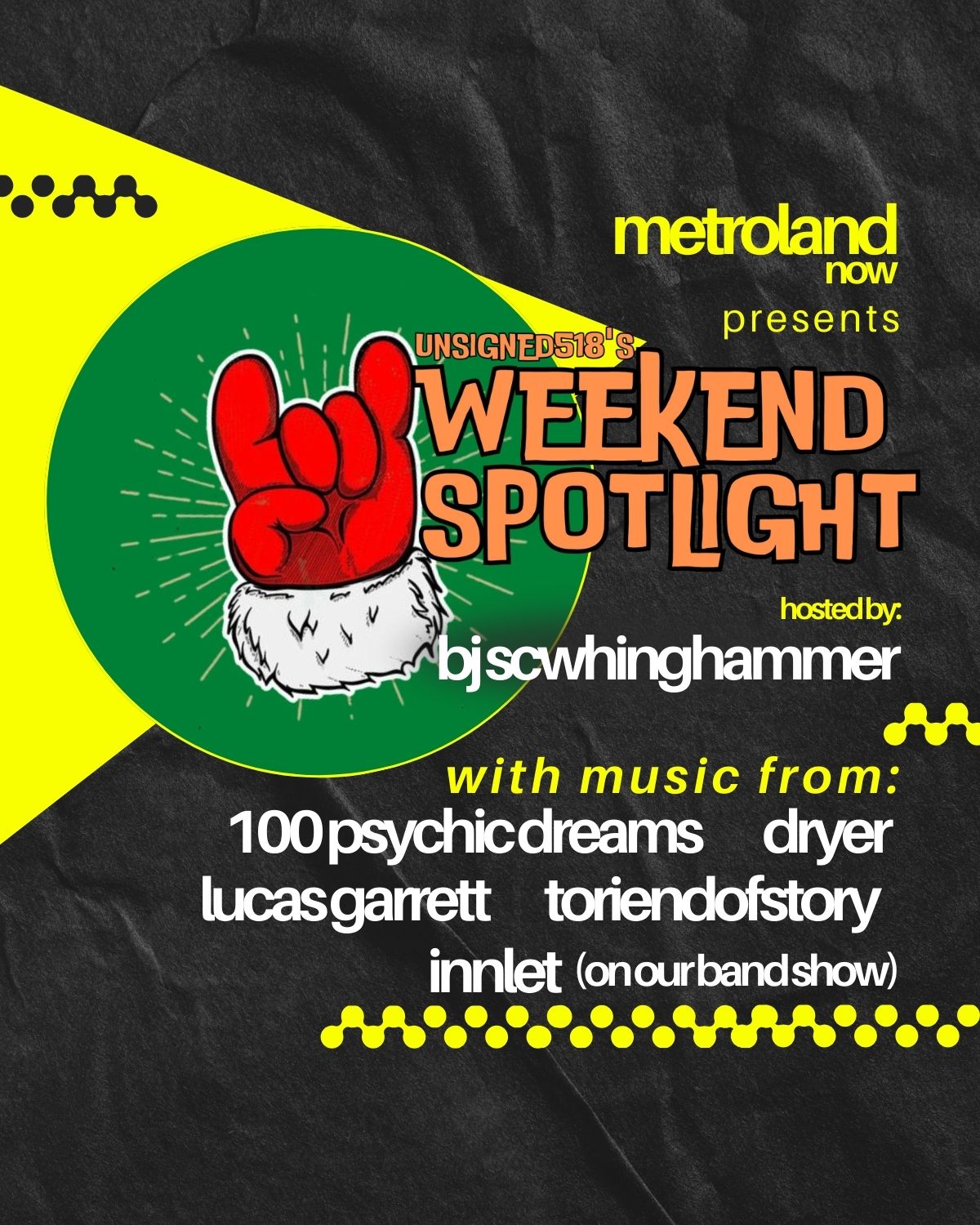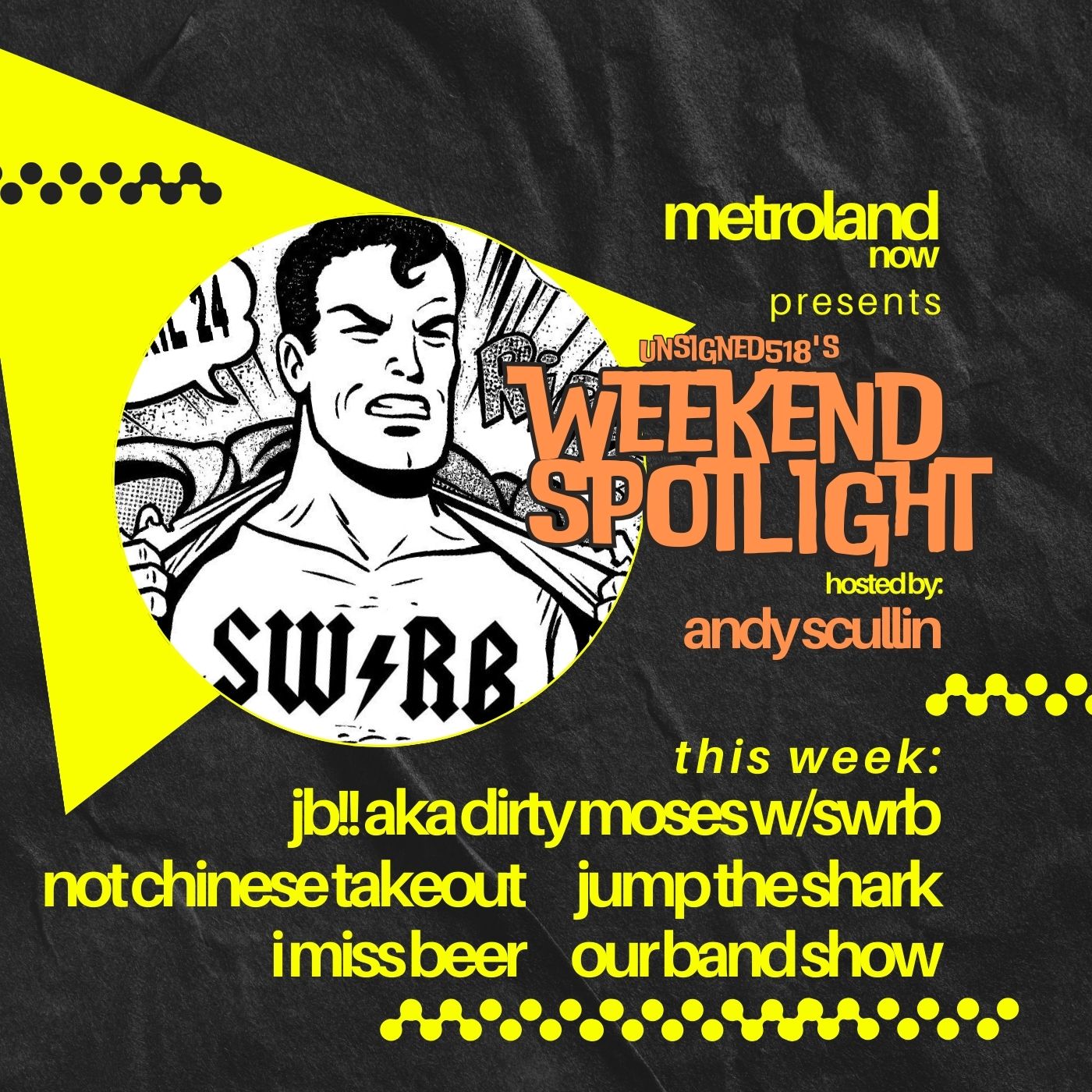[00:00:01] Speaker A: He was born on a Saturday in 73? He loves park rock music. Finding the 13 cabin in the desert on the beach guitar with a short whip radio back his motherfucking Andy scolding look at motherfucker cause here he comes Andy scrolling, wearing his orange hat?
[00:00:27] Speaker B: Welcome to unsigned 518. I am here with Vintre Hill. I have Vincenzo and Dimitri. How's it going?
[00:00:34] Speaker C: It's going good. How are you?
[00:00:35] Speaker B: I'm fantastic.
[00:00:36] Speaker D: It's going great.
[00:00:38] Speaker B: And so obviously, the name. I mean, I say obviously, like, even after I knew both your names, I was, like, asking how to pronounce the band name, and you're like, oh, it's, you know, Vin from Vincenzo and Tree from Dimitri. And I was like, holy shit, that is so clever. Like, I didn't. I didn't even catch that. But I've definitely heard the name around a lot. You guys are definitely playing shows. I know you've played shows with bands that I've played with playing around. And you're based out of Troy area, correct?
[00:01:08] Speaker D: Yeah, we're both from Brunswick, but for the people that aren't from Brunswick, I think Troy is definitely the easier way to go about telling us, telling them where we're from.
[00:01:17] Speaker B: So, yeah, I mean, we're in Schuylerville, but a lot of the times I say Saratoga, because when you say Skylerville, people are like, where's that? You know?
[00:01:24] Speaker D: Yeah.
[00:01:25] Speaker B: So how long have you guys been doing what you're doing?
[00:01:30] Speaker C: So we've been going since, like.
Well, initially, we're a cover band that kind of started in 2018 when we were in middle school, and after COVID, we got back, the band got back together, and one heads towards originals, and me and Dimitri stuck with it. And that was in, like, 2021. 2021? Yeah, when we're in high school and then now 24, and we love what we do.
[00:01:59] Speaker B: So been a band since you were in middle school?
[00:02:03] Speaker D: Yeah.
[00:02:03] Speaker B: And is it just the two of you in the bands?
[00:02:06] Speaker D: We've had other members, but as of right now, it is just the two of us. We are looking for a bass player, but as it stands right now, as long as it's the two of us, we both know how to make noise, we both know how to come out and have a good time, so we just keep doing our thing.
[00:02:20] Speaker B: Right. And what are each of your roles in the band?
[00:02:23] Speaker D: I'm the drummer.
[00:02:24] Speaker B: Okay.
[00:02:25] Speaker C: I'm the lead lead singer and guitarist.
[00:02:29] Speaker B: So you don't do vocals at all? Just the drums?
[00:02:31] Speaker D: I have not done any live vocals, but there's one track coming up on our second album where I did do some backing vocals, which was really fun. So I'll definitely beg him to do more of those because that was definitely interesting.
[00:02:43] Speaker B: Yeah, that's kind of the same with our drummer. Like John's, you know, he sings very well and, like, his voice is on all of our song or several of our songs, but live, he's like, I don't even need a microphone. Don't even bother, you know, so starting out as a cover band, I mean, because that's like, exactly what we did. And I feel like that's just such a nice way to cut your teeth because it gets you absorbing everybody else's stuff. And realistically, in my mind, like, a sound, like, if you have your own sound, like, your own sound doesn't come from a vacuum. It comes from what you've been listening and what you've been playing. So, like, did you find, like, being in a cover band was, like, super helpful or were you, like, chomping at the bit to, like, just start writing?
[00:03:31] Speaker D: I'll definitely let him answer separately after this. For me, it was really helpful. I started out drumming when I was probably seven or eight. It was jazz drumming. And I did jazz band in middle school and high school. But definitely, like, when we started doing cover stuff for punk, it definitely really got me to find my punk rock side and really helped me to progress to where I am now and the type of music that we write.
[00:03:55] Speaker C: Yeah, my main instrument is guitar. I started playing when I was 13 and I immediately started, like, I fell into, like, the Nirvana and, like, the green day. Learn of things.
[00:04:07] Speaker B: So when did you, like, recording song? You know, obviously recording is different than just playing gigs. You know, you were playing gigs since you were in middle school, which is crazy to me, but, like, it's such a.
I don't know. I want to say, like, it's such a leg up on a lot of bands because a lot of the times you'll find bands really get rolling, like, after college, you know, like, they don't put their focus into music. So do you think that once you started recording songs and writing songs, did you find that because you had that bass and you had that bass so young that that just, you hit the ground running, I guess, so to speak.
[00:04:48] Speaker C: Like, well, I think in over the period of time and, like, the shutdown, I obviously that music was my life, became everything I did. And I was like, I love this. I'm glad this is everything I do. So then I started writing and I brought stuff to Dimitri, when we got back together, after everyone could see each other again, and he liked what I brought forth. He still does.
And, yeah, we kind of just take what we get and keep going with it.
[00:05:17] Speaker D: Yeah, I think what he was saying about the COVID thing, like, I was writing my own stuff, and he was. You were doing lives and stuff on Facebook that were really. He was on the news for it, too, which was awesome. So really just exploring that musical side. And when we came together, I think the first song you showed me was Cork, and it just kind of happened where he was playing something, and I just sat down and started playing. And that's just kind of how we wrote the whole first album, was just. He would show me something, I would start playing, and we'd probably have some type of rough draft for the song just by sitting down. And we just. We just have such good chemistry that it just. Everything worked really nicely.
[00:05:56] Speaker B: And when you write songs, like, do you find that it's. Are you like, an acoustic guitar, write it on acoustic and then translate it to a. Or do you go full electric right out of the gate?
[00:06:06] Speaker C: Well, I guess almost a mix of both. It's more me lying in my bed when I should be sleeping, facing the ceiling with my electric guitar, writing stuff. Sometimes it's written on acoustic and then translated. It really depends, but it's mostly these days, it's on my electric but not plugged in.
[00:06:25] Speaker B: Right. Nice. I'm laughing. Calvin, obviously is up on the couch with you guys. He's getting restless.
Calvin makes appearances on almost every podcast episode. You know, there's even at the end, I told you how we do the gratitudes, the shout outs. A lot of people, not a lot of people, but a few people have thanked Calvin.
[00:06:44] Speaker D: He's a really good co host.
[00:06:46] Speaker B: He is a good co host. He's sometimes a very loud co host, but so, you know, obviously playing gigs, like you said, like, you know, you've been doing it since middle school. Then you mentioned kind of, like, the shut down was, like, the turning point when, like, you really started writing. And were you playing a lot of gigs before then, or were you, like, a true garage band where, like, your output was wherever you happen to be practicing?
[00:07:11] Speaker D: Definitely in middle school, I would say it was more garage bandy. I mean, we started as, like, talent show kind of deal, so. And we had members coming in and out, and it really. I don't think it really became Vintry Hill until you got there, because that's kind of what got it going. But big shout out to the refrigerators, because they definitely got us going, gave us a lot of openings for them just when we were middle schoolers and going into high school, so that was cool to have that. But, yeah, I definitely think that that was a good leg up for us to start getting shows. But, yeah, I'd say we started more as kind of just practicing, just having fun. And it turned into something more serious as high school kind of progressed pretty.
[00:07:54] Speaker C: Much once we started getting, knowing that we want to make this an original project here and, like, let people hear our thoughts and our voices, how we feel, get people to relate on something that we can put out there and bring everyone together, have a fun night. When we perform, that's when we're like, okay, this is more than we expected, I guess.
[00:08:17] Speaker B: And did you find, like. Cause I always say, you know, again, and we started out as a straight cover band. We were doing three hour gigs of nothing but covers, and then we slowly started writing our own songs. And I.
I found it to be kind of scary to let you know. Like, playing cover songs was easy to let you know because you're, like, not hiding behind, but, like, you have, like, this separation from the music where you're just playing what somebody else wrote. And, you know, people will usually connect with it. Like, especially if you're picking the right songs to play. Like, your crowd is going to, like, connect with it. And then when you start doing your own songs and like you said, you know, your own thoughts and your own, like, did you find that was, like, super scary?
[00:09:04] Speaker C: Me personally, I didn't find it that scary because, I don't know, it's like, whatever I had to say, I knew that at least someone out there could be able to hear it and be able to melt with it. But at the end of the day, I wasn't really that nervous or scared about it. I would just want to give you, everyone a good show.
[00:09:23] Speaker D: I think more people would make music nowadays. I think the problem is people don't realize how subjective music is. I mean, it's like tasting. It's your senses, it's. Everyone has different opinions on things, but I think once you realize that, you might see something different than someone else, but someone's going to see something the same way as you. It makes sharing things a lot easier. And you go out there and you just have a good time and hopefully someone else is going to have the same good time that you're having from a different perspective.
[00:09:48] Speaker B: And, like, we've, you know, me personally, but, like, short wave radio band, like, our philosophy has always been, like, to give, like you said a couple times to give people a good show. And, like, the way we do that is we have fun. And if we're having fun, then they're having fun. But, you know, the one rule is if we're not having fun, nobody's gonna. You know what I mean? Cause, like, who wants to sit there and watch people not having fun, you know, like, no matter how to me anyway, no matter how good the music is, if people are up there, like, looking bored, like they don't want to be there, then I. I'm like, okay, I'm tuning out then, you know, if you're not giving it, if you're not giving it to me, I don't want to give it back. And, like, there's been plenty of times where I've been watching bands up on stage that are very talented, and I'm just like, these guys look like they don't want to be here, and then I'm just like, I'm. I'm not into it. So I appreciate that you are thinking about what you're putting out, you know, and giving people a good show. That's not a rare quality, but that's. It's definitely, it's nice that you're acknowledging it. Like, I appreciate that, but right now, I think we should probably play a vintre Hill song. Did you have one in mind?
[00:11:03] Speaker C: I mean, I think Cork would actually be a good one because Dimitri was mentioning how that's the first one we came up with.
[00:11:08] Speaker D: Yeah, this was our first written song, so I think Cork is a great one to go with. It's. It's a fun song. It has good energy and, and it.
[00:11:16] Speaker C: Also, like, has good melodic qualities and it's like, instrumental wise, it's. It's put together very well. I think more than just your standard power cord, it throws, you know, regular minors and stuff like that. Shifts, major and minor shifts and stuff like that. So I think it's a good one to showcase.
[00:11:36] Speaker B: All right, cool. So let's listen to Cork Vintri Hill, and we'll be right back to talk some more with Vincenzo and Dimitri.
[00:12:08] Speaker A: Pain. I'll keep it. When she's in my brain she go forth and back all throughout here with the wind up in my care oh, what a time city hanger in my mind it's better over time which is like a fun world oh, what a time say hanger and my mind gets better over time which is like a fine line what a time say the anger in my mind it's better over time, which is like.
[00:14:31] Speaker B: So that was Cork Vintri Hill, and that was off your first album, and that's the only one that you have at the moment, correct?
[00:14:40] Speaker C: Yes, our first album titled. Okay, I will. Which was released in 2022. But, yeah, only one out right now.
[00:14:47] Speaker B: Nice. But you may be working on something for the future here.
[00:14:52] Speaker D: Yeah, we're working on a second album right now, and it is amazing. If you think the first album is amazing, you have not seen anything yet. We are. Have really progressed a lot, and it is a really fun piece of work. Not only just good, but it is a blast to play.
[00:15:08] Speaker C: Yeah, Dimitri.
Dimitri is right here with this one.
It's definitely evolved with this. The songwriting, the intricacy of the work, and also the overall mix of everything, kind of giving anything more of a fatter, nice, more swelling tone with the mid. With the low mid ranges and stuff like that, and the guitar.
But overall, it's going to be fun. We can't wait to release it. It's great album artwork as well, promotional type stickers and stuff. We have up in line for it, too, so it's gonna be a great era.
[00:15:48] Speaker B: And when you record, like, is that. Do you do it yourself? Do you go into a studio? Like, what's the recording process like?
[00:15:55] Speaker D: So we went to Kevin Brando's studio to do the drums, and he's had tons of different musicians and artists who are extremely talented there, so it was an honor to be there, and it was a really cool experience. For the second album, we actually were given.
We borrowed things to use, like a mixer and mics and different things, and we were able to do the drum tracks at the house, and we found that we really liked the house sound, so we went with it for the second album, and it just really works for that energy.
[00:16:27] Speaker B: Did you find, like, being in a studio, you know, where other grades have been, like, where there's just, like. There always seems to be, like, this energy when you're in a place where, like, all this cool music has happened, did you find that was, like, intimidating, or did it bring out a little more creativity? Like, when you were playing? Like, did you happen to notice the vibe in the.
[00:16:50] Speaker D: It might be just me, but everything hits me later, so I don't think that really settled in until after I was done. I feel like when I'm in that moment and I'm recording or doing something, I'm really locked in. I think the only thing that gives me pressure if I screw up three, four times in a row and then it. Then it really starts to mount. But otherwise, I think it's just cool to look back on. I'd say more than in the moment for me.
[00:17:14] Speaker B: I mean, that's almost like a.
Like an athletic way of looking at something. You know, to be like, it doesn't matter. The arena, it's. You know, you've got a. Got a job to do, and you're gonna do it. So, like, because, again, if I was, like, to go into, I don't know, you know, someplace where, you know, a descendants album was recorded, and I'd be like. I wouldn't be able to concentrate. I would just be like, too much like, oh, my God, I can't believe I'm in this room. But, like, to be able to just be like, nah, I got a job to do. I'm gonna do it. I applaud that. I think that's cool. So, the album that you're working on now, like, at what stage kind of are we at?
[00:17:51] Speaker C: So, for the most part, everything is recorded. Just gotta do vocals on one more song and put in the bass, and I record the bass myself.
[00:17:59] Speaker B: Cool.
[00:18:00] Speaker C: But then it has, like, a pre mix, and then me and Demetria are gonna. We get together, we're gonna listen to it. We're gonna do our different leveling and stuff like that to get everything balanced out and nice and saucy. And then it will be. Go through the mastering system, and then we'll be ready to hit the platforms.
[00:18:22] Speaker B: So there's. You know, there's not. Obviously not a release date, but, like, do you have, like, a targeted hopeful?
[00:18:29] Speaker C: Our target is.
I think it's realistic to think that maybe the summer.
[00:18:34] Speaker D: It'd be nice to have it for the summer. I mean, I know as, like, a teenager, almost 20 now, gonna be 19, but still teenager. It's. Summer music is the best type of music because you're with your friends and you have so much time to listen to things. So I think, yeah, it'd be awesome for the summer for people to hear new music.
[00:18:53] Speaker B: Hell, yeah. Hell, yeah. So, do we want to hear another Vintree Hill song? Before we take off?
[00:18:59] Speaker D: We would like to play classic detective for you.
[00:19:03] Speaker B: And what's the kind of the backstory with classic detective?
[00:19:07] Speaker C: So, classic detective was a song that initially wasn't gonna be on our first album. It wasn't written until we had our own little kind of game plan of what we're gonna put on that on the first album. And then I was up late one night, like I said, how I write songs when I should be asleep.
I just started writing it because I was just kind of just experiencing a lot of this different stuff going on at that time when we were first starting to write songs and put everything together and I wrote it about kind of this. Your modern day, like gossipers, I guess, you know, you entrust someone with like, information and they just go spew it everywhere and there's a big breakdown in it. And that was actually written first and then I wrote the verses and the choruses and everything like that. And then it came together pretty beautifully. And.
[00:20:01] Speaker D: Yeah, yeah, the breakdown was a lot of fun.
It reminds me of like, I don't know if you've like seen those like surfer movies or like, you hear those like the.
But it was. That's kind of what it reminded me of when he played it. And then we just did some really cool stuff. Floor Tom kept kind of the same beat as the song and then went into like a crash bell breakdown and he had a guitar solo before the breakdown. And I remember working on that and just hearing him work on it was just, it was just such a cool experience. But it's definitely a really cool song and a fan favorite for sure.
[00:20:42] Speaker B: All right, so let's listen to classic detective Vintre Hill and then we'll be right back to wrap it up.
[00:21:26] Speaker A: I'm watching what I tell just to be safe it's been too many times where I have told she had to figure it out once it's grown old though I can't trust you with anything I say which seems your credibility has gone away.
Though I can't say bad gentle when they hit me because you're my best friend and she give it on her hands and fears and starts to beg for me to tell a cigarette that can't be kept I'll tell her anyway just to get her off the floor I know I can't trust you with anything I say wishing your credibility has gone away though I can't stay that it's in with me because you're my best friend so I can't trust you with anything I may say.
We seems your credibility has gone away though I can't see that it's. Yeah. With me because you're my best friend.
[00:26:43] Speaker B: We have a classic detective Vintree Hill. And I want to thank you guys so much for taking time out of your day to come by the house and talk to me. I really appreciate it. And before we go, I want to give each of you the chance to say what I refer to as your gratitude. So go ahead and start.
[00:27:00] Speaker C: I'd like to first and foremost thank support from management and family and band member. Of course, I'd like to give gratitude towards support from music teachers. For instance, my band teacher, mister cluster, lets us borrow a lot of equipment, gives us a lot of supportive feedback. And my old chorus teacher, Mister Price, was very supportive of just this dream that we have. And it means a lot coming from those accomplished people who are pretty much professionals telling you that you're going to make it someday. So it means a lot. And just a quick shout out to Mike Valeny and the folks at Albany Empire for giving an amazing music scene and the opportunity to play what we want to play and give us the ability to put on great shows and perform for people, which is really the love of it.
[00:28:02] Speaker D: I like to shout out my parents and your parents both for the support that they have for us. I'd like to shout out both my drum teachers that I've had. Ted McKenzie and Mark Foster, both have really helped me grow a lot. My jazz band teacher, Kyle Chamberlain, really helped me grow. My dad and his band, the refrigerators, have also really helped us get a foot up, and I really appreciate everything they've done for us. And from supports, from friends and family at shows and different things. You guys really mean the world because, you know, there's not a, not a band without a crowd. So I appreciate them and thank you for having us.
[00:28:41] Speaker B: All right, so, Vincenzo Dimitri, otherwise known as Vintree Hill. I'm Andy Scullen. This is unsigned 518 and I'll see you on the road. Unsigned 518 is produced and hosted by me, Andy Scullen. New episodes are available every week wherever you stream. Podcast. If you would like to help support the show, please like and subscribe wherever you are listening. Or you could buy me a
[email protected]. Unsigned 518 if you would like to advertise on the show, send me an email at unsigned 518 mail.com and to be a guest on the show, reach out to me through Instagram. Unsigned 518 take care of one another and I'll see you next week.
